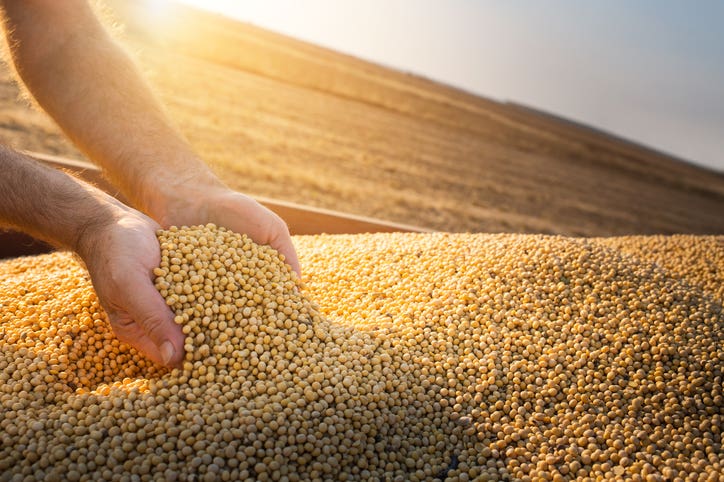These incredible creatures contribute to 6.5% of global grain production
A groundbreaking new study shifts the focus from conventional agricultural practices to the intricacies of soil biodiversity

[Oct. 3, 2023: Staff Writer, The Brighter Side of News]
Earthworms, often overlooked in the vastness of global food production, play a pivotal role by contributing to nearly 6.5% of global grain yield and 2.3% of legumes produced annually. (CREDIT: Creative Commons)
In a groundbreaking study that shifts the focus from conventional agricultural practices to the intricacies of soil biodiversity, scientists from Colorado State University (CSU) have unveiled a startling finding.
Earthworms, often overlooked in the vastness of global food production, play a pivotal role by contributing to nearly 6.5% of global grain yield and 2.3% of legumes produced annually. This information has been published in the respected journal Nature Communications.
To put these figures into perspective, the contribution of earthworms in global food production equates to a staggering 140 million metric tons of food each year. That's roughly the equivalent to the amount of cereal grains, including rice, wheat, rye, oats, barley, maize, and millet, produced by Russia – the fourth-largest producer globally.
Relative contribution of earthworms to yield (% of total) of a cereal grains (i.e., grass species), and b legume yields. Grains considered include wheat, rice, maize, and barley. Legumes considered include grain legumes (soybean, dry beans, broad beans, cowpeas, peas, pigeon peas, chickpeas, lentils, lupines, and other pulses) as well as forage species, alfalfa and clover (see Figs. S1 and S2). Darker shades of green indicate stronger estimated earthworm impacts. (CREDIT: Nature Communications)
According to Steven Fonte, the study's lead author and associate professor of agroecosystem ecology at CSU's Department of Soil and Crop Sciences, “This is the first effort that I’m aware of that’s trying to take one piece of soil biodiversity and say, ‘OK, this is the value of it; this is what it’s giving us on a global scale.’”
The Role of Earthworms in Soil Health
Earthworms, often dubbed the "engineers of the soil," work in myriad ways to boost plant growth. They are instrumental in creating a healthy soil structure, aiding water retention, and facilitating the decomposition of organic matter, which, in turn, releases essential nutrients for plants.
Related Stories
Moreover, these wriggly creatures have been linked to the production of hormones that promote plant growth and provide a defense against common soil-borne diseases. Some studies suggest that the presence of earthworms can surge plant productivity by an astonishing 25%.
Fonte, in collaboration with Nathan Mueller, an associate professor, and Marian Hsieh, a doctoral student – both from the Department of Ecosystem Science and Sustainability at CSU, mapped and analyzed data on earthworm abundance, soil properties, fertilizer rates, and crop yields to arrive at their groundbreaking conclusions.
Regional Impact and Earthworm Abundance
Their analysis revealed a pronounced impact of earthworms on grain production, particularly in the global south. A whopping 10% of grain yield in Sub-Saharan Africa and 8% in Latin America and the Caribbean can be attributed to these organisms. Fonte attributes this regional influence to the limited access to fertilizers and pesticides by farmers in these areas. “Earthworms are contributing a lot in these areas where we have fewer chemical inputs,” he explained.
A farmer's field in western Kenya. (CREDIT: Steven Fonte)
The research particularly focused on the impacts of earthworms on four grain crops: rice, maize, wheat, and barley. Additionally, legumes, including soybeans, peas, chickpeas, lentils, and alfalfa, were also under the microscope.
A Call to Reevaluate Soil Biodiversity
For decades, the importance of soil biodiversity has been overshadowed by other agricultural practices. Fonte hopes that their research will shift the narrative. He emphasized the tangible, positive impacts of healthy soils on crops and said, “If we manage our soils in a more sustainable way, we can better harness or leverage this biodiversity and produce more sustainable agroecosystems.”
An earthworm in soil. (CREDIT: Steven Fonte)
Echoing this sentiment, Diana Wall, a professor in the Department of Biology and the science chair of the Global Soil Biodiversity Initiative, hailed the study as "a really clever, very data-rich paper." Wall added, “It’s really impressive.”
In light of the global challenges posed by drought and erosion, Fonte believes the study's implications could be far-reaching. He highlighted how earthworms enhance soil porosity, leading to better water capture and retention.
Contribution of earthworms to grain and legume production across eight global agricultural regions in: a relative yield increase (% of total), and b absolute production increase (millions of metric tons). (CREDIT: Nature Communications)
However, Fonte stressed that the aim isn't to transplant earthworms into new territories. The focus should be on improved soil biology management where earthworms naturally exist, reducing the dependence on agrochemicals and maximizing agricultural productivity.
“Soils are still this huge, big black box that we don’t fully understand,” Fonte mused, suggesting that other, potentially even more influential, soil organisms await discovery, particularly within microbial communities.
In an age of rapid environmental changes, understanding and leveraging natural processes might be the key to sustainable agriculture. Earthworms, with their silent yet substantial contributions, have undoubtedly cemented their role as unsung heroes of our food systems.
For more environmental news stories check out our Green Impact section at The Brighter Side of News.
Note: Materials provided above by The Brighter Side of News. Content may be edited for style and length.
Like these kind of feel good stories? Get the Brighter Side of News' newsletter.
Joseph Shavit
Head Science News Writer | Communicating Innovation & Discovery
Based in Los Angeles, Joseph Shavit is an accomplished science journalist, head science news writer and co-founder at The Brighter Side of News, where he translates cutting-edge discoveries into compelling stories for a broad audience. With a strong background spanning science, business, product management, media leadership, and entrepreneurship, Joseph brings a unique perspective to science communication. His expertise allows him to uncover the intersection of technological advancements and market potential, shedding light on how groundbreaking research evolves into transformative products and industries.



